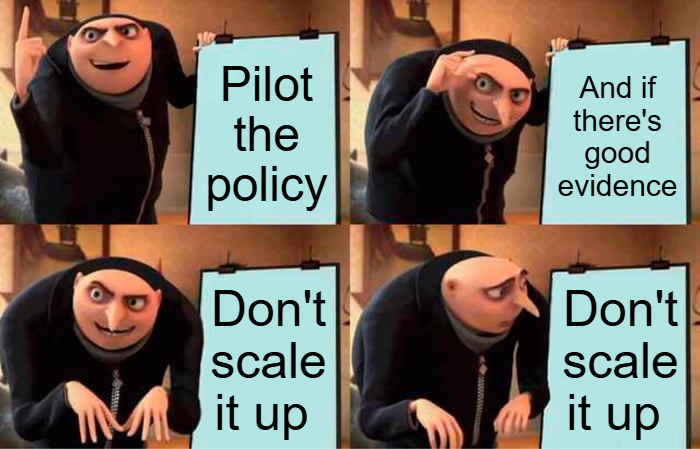Policy memes 2.0 - predictions for 2025

Policy Director
A year ago, I wrote a blog for Re:State on policy memes. I still think about that piece a lot, because the longer you work in Westminster, the more policy memes you see. And a few co-conspirators have been good enough to send me new ones they see in the wild (keep them coming)!
So in honour of our new Government, I thought I would write an update the latest and most fashionable policy memes to grace the boardrooms of Westminster.
For those of you who are first-time fliers on policy memes, here’s the deal. Policy memes are ideas which are unusually salient in the Westminster ecosystem. They usually have some truth to them, otherwise they wouldn’t be popular. But over time, their popularity becomes detached from the actual ideas involved, and they become a kind of status-signal for being ‘in the know’. The kind that makes good policy discussion harder, not easier, as Alex Chalmers and Anastasia Bektimirova wrote about in ‘Death by a thousand roundtables’ last year.
2024 was a big year for the policy memes I wrote about last January. ‘Stakeholderism’ looks quite different under Labour, who have declared a moratorium on new statutory consultees and curbed the powers of community groups to instigate judicial reviews. But ‘Get someone else to fix it*’ is alive and well, in a Government which has announced dozens of new public bodies and inquiries since it was elected — do we expect yet another independent review into social care to say anything new?
And AI has had a huge year (including in our own research), culminating in the Prime Minister launching the Government’s AI Opportunities Action Plan.
But to successfully navigate policy in 2025, you’re going to need more. So here are the latest policy memes we have seen out in the wild:
1. Pilotitis
There are probably more ‘pilots’ in government on any given day than there are in Heathrow. And that’s good — after all, we want Government to innovate, and build the evidence base to do it.
But pilotitis is the institutional obsession with pilots, not because they let government innovate but precisely because they let it avoid innovating. The real benefit from innovations only comes if they’re scaled up to serve millions of people. But across Whitehall, most pilots are never even evaluated, let alone scaled up. Because it’s cheap to pilot something (and to keep piloting it), but genuine reform is sometimes costly.
2. Hubs Theory of Everything

The Hubs Theory of Everything starts from the correct premise that services are often bad at collaborating around the needs of the public, and operate in siloes. Inevitably, the prescription is more ‘hubs’ — the co-location of more public services, in one place, so they can collaborate.
The theory here is that these hubs are more than the sum of their parts, and pay big dividends from colocation and information sharing. But if hubs are so good, why do they hardly ever exist unless central government is prepared to front up the cash?
A ‘one stop shop’ may be attractive to politicians, but if the capacity and capability isn’t there to meet the demand for the core public services, then a bit more collaboration is often a drop in the ocean.
3. Risk-aversion

In an era where the Government wants to work “more like a start up”, it’s popular to point out that the State’s risk tolerance for failure is significantly lower than the private sector’s. Government provides essential service, often without any public choice, and failures can affect millions of people. Our research reflects how this risk-aversion manifests in Whitehall, and the sentiment is a common reaction to any suggestion of changing policy.
But what are they comparing that risk to? Because the status-quo isn’t risk-free either. Particularly when it comes to the risks of innovative technologies like AI, we often assume that performance needs to be near 100 per cent, and keeping humans in the loop will guarantee that. Unfortunately, that’s a pipe dream, and an unrealistic standard to expect from any public service — human or automated.
The risk of change can only be measured against the risks of sticking with the status quo. Looking around the State today, those risks look higher than they’ve ever been.
But if I had to pick one policy meme which I think will dominate 2025, it would be…
4. Everythingism

Everythingism is the belief that every government policy can be about every other government policy, and that there are no real costs to doing that.
It stems from the realisation that all areas of public policy are connected to all others, particularly in the complex world of global trade, international migration flows, and the internet. Whilst it’s correct as a description, it’s bad as a prescription, which is where policymakers go wrong.
Everythingists believe that any policy can be optimised to achieve many different goals, whilst being just as effective at delivering its primary goal. In other words, they believe that not only is everything about everything else, everything must be made about everything else, for anything to get done.
Most economists would disagree. The more goals we try and achieve with any one programme, the more inefficient the programme is at delivering all of them put together. For example, where many policymakers see a £300 billion annual procurement bill as an opportunity to advance other policy goals, they should see a risk instead — procurement is often wasteful and inefficient already, without introducing more policy goals.
But Everythingism persists because of its organisational value, not its actual value. It doesn’t seem to cost any one policymaker anything to fiddle with a project which already exists, but it costs a lot to start a new project. In reality, of course it does cost a lot to tinker. The actual costs are the massive, but hidden, inefficiencies which come from insisting every government programme is also a vehicle for objectives like Net Zero, Levelling up and AI.
The Government have plenty of big challenges to tackle in 2025. They find themselves cash-strapped, buffeted by crises, and with big Missions to deliver. Their biggest mistake would be to surrender any plan to prioritise, and instead try and deliver the Missions through Everythingism — tinkering around the edges of anything they can get their hand, only to fall short on everything.
